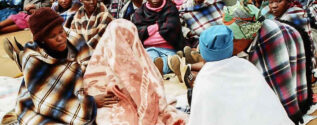Weddings in South-East District, Botswana: Negotiating Change
Botswana is a small, landlocked country in the heart of southern Africa. Often described as ‘Africa’s miracle’, its diamond mines are the most productive in the world, bringing rapid development and political stability since independence from Britain in 1966. But for over thirty years, Botswana has also faced one of the world’s worst epidemics of HIV and AIDS. The government, local NGOs and international agencies have worked together to provide groundbreaking responses – including the free provision of antiretroviral treatment, nationwide – but HIV infection rates remain stubbornly high.
For over a generation, marriage has been increasingly hard to achieve in Botswana. This ‘marriage crisis’ is rarely linked to HIV/AIDS; instead, blame has fallen on new expectations of extravagant celebrations, and on traditional expectations of bridewealth payments (bogadi, paid by the groom’s family to the bride’s family). But churches, NGOs, and government have cast marriage as a social and moral remedy to the epidemic. Recent years have seen a sudden spate of weddings, with younger couples negotiating marriage much more quickly and successfully than their parents’ generation; but many Batswana remain skeptical about what these modern marriages mean.
Over the years, I have helped negotiate, plan, and celebrate countless weddings in Botswana – often pitching in as a driver, photographer, cook and server. While weddings are frequently lavish, most of the objects involved are used regularly afterwards. Wedding guests contribute to celebrations in cash or in kind, but seldom bring gifts, and are acknowledged by the quantity and quality of food they are served in feasts.
Wedding practices in Botswana vary among its merafe, or ‘tribes’. Most of these photographs and objects come from the Balete, a small morafe in Botswana’s south-east. Some were given to me in recognition of the roles I’ve played in family life; others I acquired while helping out with the weddings of friends and neighbours. Together, they offer a glimpse of the experience of weddings in contemporary Botswana.



